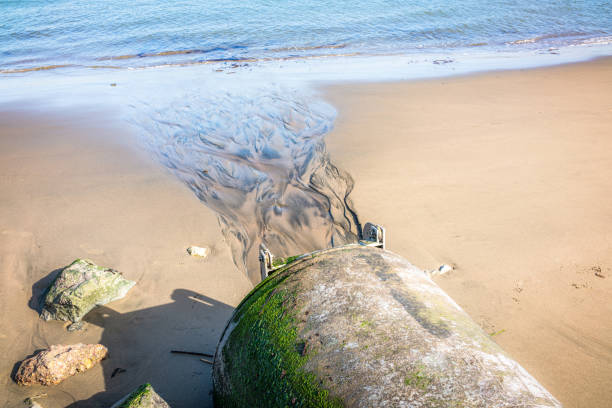The UK-wide day of action turns the spotlight on the detrimental acts of water companies and government inaction in addressing the issue of sewage pollution.

Protests are taking place up and down the country today aimed at ending sewage pollution which is leaving Britain’s rivers and seas in a critical state.
The National Day of Action on water quality is being organised by Surfers Against Sewage (SAS), a grassroots movement dedicated to the protection of oceans, beaches and wildlife, which has joined forces with other end sewage pollution campaigners.
Put words into action
The environmental activists are urging the government and industry to put words into action and deliver on promises to tackle sewage pollution.
A total of 11 protests are taking place across the UK, each targeting one water company, including Scottish Water, Northern Ireland Water and Welsh Water.
Sewage is being poured into the country’s blue spaces at alarming rates. The decision by water companies and the government to view rivers as places capable of absorbing pollution has turned watercourses into what has been described as an all but ‘open sewer.’
Research shows that in 2020 alone, UK rivers bore the brunt of than 3 million hours of sewage discharge.
SAS blames the worsening crisis on weakened legislation and a defunded regulator, which has enabled the water industry to operate with near impunity.
“An ineffective system and an inexcusable situation, somewhat akin to tasking bank robbers with their own arrest,” writes Hugo Tagholm, chief executive of SAS, in the foreword of the organisation’s 2021 Water Quality Report.
Water industry privatised in 1989
Britain’s water and sewerage industry was privatised in 1989. Since the 1989 Water Act, which privatised water, selling it to private water and wastewater firms, the industry has, says SAS, “failed to plan and invest sufficiently in protecting the blue environment and those who use it.”
The scale of water pollution generated by water companies made the headlines this week.
A report shows how Thames Water dumped raw sewage into rivers thousands of times in 2021. Campaigners revealed that last year Thames Water – the UK’s largest wate and wastewater company – dumped untreated effluent of more than 68,000 hours into river systems around Oxford. The private utility company discharged raw sewage into the River Thames and its tributaries 5,028 times in 2021, according to research by the Oxford Rivers Improvement Campaign (ORIC).
Campaigners say that failure to invest in the capacity of the treatment works has led to more raw sewage in rivers.
Mark Hull, a former water industry consultant and founding member of ORIC, described inaction to address the issue as “scandalous.”
“Thames Water and the government’s Environment Agency have failed to deal with this problem over many years. Their ongoing underperformance beggars belief – especially as the industry’s financial regulator, Ofwat, have made it clear that they would not oppose the necessary investment,” said Hull.
Warnings have been made that agriculture and the industrialisation of food production is turning rivers into ‘open sewers.’
Last month, the River Wye was described as an open sewer, as vast amounts of manure continue to pollute the Wye’s waters. Its location at the centre of intensive poultry production is meaning that the high volume of manure from birds that is spread on the land as fertiliser is washed into the rivers and tributaries when it rains, subsequently turning the river green.
‘It’s crap!’
A long-standing campaigner for clean rivers is singer and keen fly fisher, Feargal Sharkey. The former lead singer of the Undertones said the biggest polluter of this country is agriculture and the industrialisation of food production.
Making reference to ‘It’s Crap’, a song by the Save Honey Hill Community Choir from Cambridge, in protest of the “unnecessary relocation” of Cambridge’s sewage works to the unspoilt site of Honey Hill in Cambridge’s Green Belt, which should therefore be protected from development by government policy, Sharkey tweeted:
“Dear @DefraGovUK, Here’s what the general public think of the government’s approach to the water industry and protecting our rivers.”
Unsurprisingly, only 14% of rivers in Britain meet “good ecological status”, and the UK ranked at the bottom in Europe for bathing-water quality in 2020 by Europe’s environmental watchdog.
Today’s #EndSewagePollution protests are calling on the government to address this sewage scandal, end sewage pollution in UK bathing waters by 2030, implement stronger and bolder targets to end untreated sewage discharge, expose the regulators further for ignoring the truth, and take the message straight to the doors of water companies headquarters.
Gabrielle Pickard-Whitehead is a contributing editor to Left Foot Forward
Left Foot Forward doesn't have the backing of big business or billionaires. We rely on the kind and generous support of ordinary people like you.
You can support hard-hitting journalism that holds the right to account, provides a forum for debate among progressives, and covers the stories the rest of the media ignore. Donate today.



